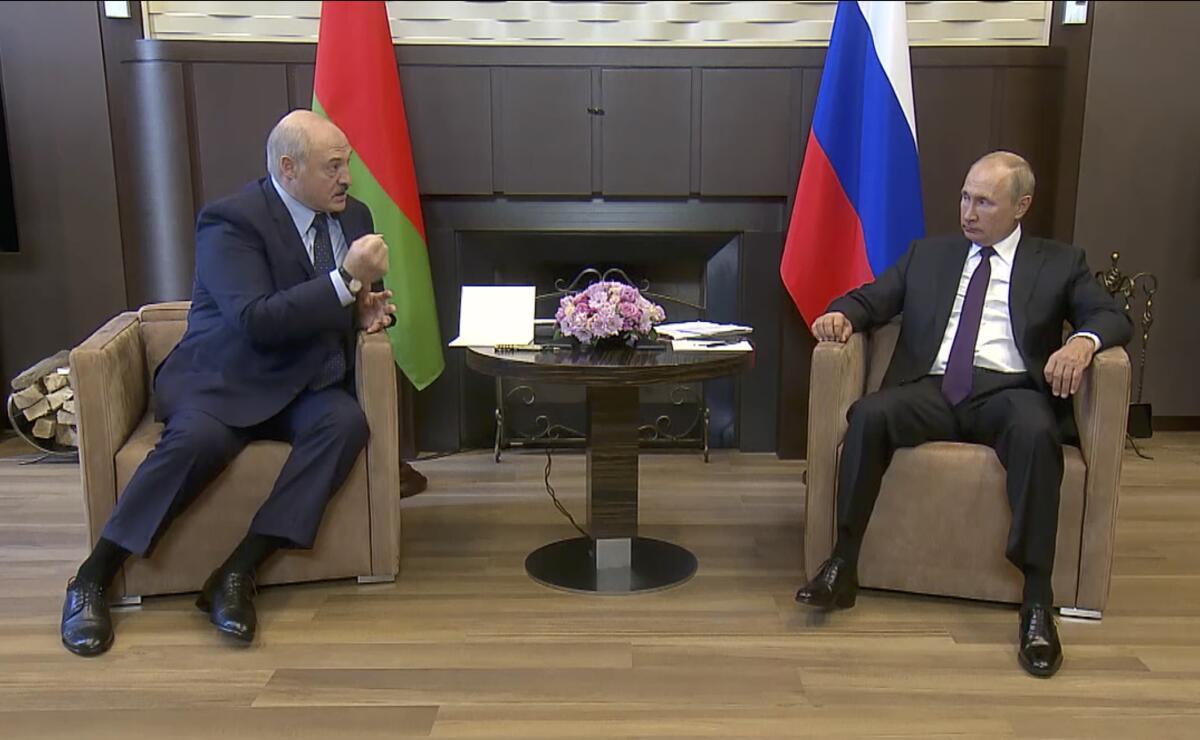Embattled Belarus president has a sit-down with Putin. What’s next?

- Share via
There could be little question as to which participant in the meeting was the supplicant.
Belarus President Alexander Lukashenko, beleaguered authoritarian, on Monday had his first face-to-face encounter with Russian President Vladimir Putin since the start of a mass protest movement in Belarus that is now in its sixth week.
The demonstrations in the former Soviet republic, which have shown no sign of abating, erupted after Belarus election officials declared Lukashenko the landslide winner of an Aug. 9 presidential vote. The election was swiftly denounced by opponents as a sham, and the European Union and the United States have said the balloting was neither free nor fair.
In television footage of the opening moments of the two leaders’ session in Russia’s Black Sea resort of Sochi, Lukashenko was literally on the edge of his seat, his body angled toward Putin, a deferential look on his face. He referred to Russia as an “elder brother” to his country.
The Russian leader, by contrast, appeared distracted and fidgety, even annoyed. He looked away. His toe tapped.
“Putin found it hard to conceal his impatience,” said Keir Giles, a Russia and Belarus expert at the British think tank Chatham House. “He seemed terribly bored with Lukashenko.”
But as Giles and others noted, any display of ennui by a former spymaster like Putin, especially one staged in front of state TV cameras, was probably highly calculated.
The Russian leader, said Oxford researcher Aliaksandr Herasimenka, is “always looking for opportunities,” perhaps intending to exploit Lukashenko’s weakness to gain economic and political concessions, such as a push for closer integration that the Belarus leader has long resisted.
In the long term, Putin might well have lost interest in propping up Lukashenko, a onetime collective farm boss who has been in power for 26 years. But at the same time, analysts say, the Russian president has no desire to see a next-door leader toppled by popular protests, a scenario that could embolden his own domestic critics.
So the announced results of the meeting — including a $1.5-billion loan to be extended by Moscow as part of a larger debt restructuring and a promise by Putin to fulfill Russia’s treaty obligations — constituted neither a warm embrace nor a cool rebuke.
The Russian leader praised as “reasonable” Lukashenko’s offer of constitutional reforms, which has been spurned by opposition figures in Belarus as an empty promise.
Having previously said Russia would send in police if they were needed to help quell violent protests, Putin said that was unnecessary at the moment — and emphasized that Russian paratroopers taking part in a joint exercise with Belarus troops that began Monday would leave when it was over.
Lukashenko, however, is not without leverage. He is well aware that Putin sees Belarus as a vital buffer between Russia and the West. Belarus is also a pathway for lucrative energy exports to Europe by Russia, with considerable industrial resources, many of them controlled by oligarchs loyal to Moscow.
On Sunday, tens of thousands of protesters turned out in the Belarus capital, Minsk, marking one of the largest gatherings yet. Police responded with a degree of force that had not been seen since the early days of the protests, making hundreds of arrests in the capital and across the country.
Those detentions included the forceful rounding up of scores of women who have been at the protests’ forefront, with many such episodes captured on video and widely viewed on social media.
But while the protests have so far maintained their momentum, nearly all the publicly known leaders of an opposition council have been forced into exile or jailed. Last week, Maria Kolesnikova, one of a troika of female opposition figures, was detained during what her camp described as an effort to forcibly deport her to neighboring Ukraine. She ripped up her passport to prevent this; her representatives say she is now in custody.
The opposition has welcomed shows of international support, including the U.N. Human Rights Council’s agreement to hold an “urgent debate” Friday on the crackdown in Belarus. Western diplomats in Minsk have rallied to the defense of the country’s only Nobel literature laureate, Svetlana Alexievich, the opposition council’s only member still at large and in Belarus. Envoys have been visiting her apartment in shifts since unidentified men last week tried to force their way inside.
But in a stroke of luck for Lukashenko, planned sanctions by the European Union have been bogged down by divisions within the 27-nation bloc over an unrelated quarrel involving Cyprus.
Putin’s strategy could be to avoid undercutting Lukashenko in public but at the same time quietly lay groundwork for an orderly transition to new and less nettlesome leadership in Belarus, said Giles. But Herasimenka, who studies digital activism and disinformation, said it is also possible the Russian leader is biding his time, not yet wanting to commit to a particular course of action.
“With him, it’s a matter of tactics rather than strategy,” he said. “I’m not sure even he knows what he will do.”
In exile in Lithuania, the opposition’s presidential candidate, Svetlana Tikhanovskaya, called Lukashenko an “usurper” who lacks legitimacy and expressed disappointment that Putin was continuing to deal with him. In her statement, she made scornful reference to the $1.5-billion credit being extended by Moscow.
“It will be Lukashenko, and not our people,” she said, “who will have to repay it.”
More to Read
Sign up for Essential California
The most important California stories and recommendations in your inbox every morning.
You may occasionally receive promotional content from the Los Angeles Times.










